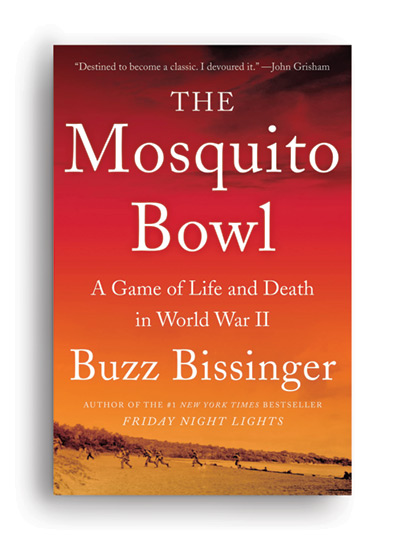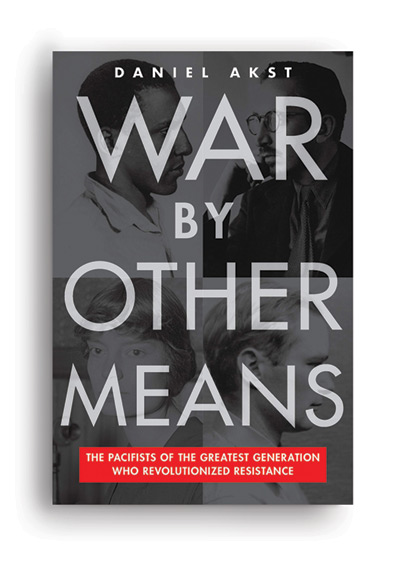Buzz Bissinger explores World War II through a group of football players pushed into the ultimate sacrifice. Daniel Akst probes the legacy of pacifist resisters.
By Dennis Drabelle

Harper, $32.50
My father sought active membership in what’s now known as the Greatest Generation, and, as a former co-captain of his college football team, he expected to be snapped up by one branch of the military or another. But the Army and the Navy rejected him because he’d had skin cancer, and the Marines turned him down for being minus one incisor, knocked out during a game. Had Dad been a little toothier, he might have taken part in the Mosquito Bowl, an informal all-Marine football game played on Guadalcanal Island in 1944 and the title of Buzz Bissinger C’76’s enthralling, wrenching new book.
The contest was occasioned by the presence of several former college football players in the 4th and 29th regiments, sent to sieze Pacific islands from Japan. The game itself had little intrinsic interest. It ended in a scoreless tie, and in the single paragraph Bissinger devotes to the play-by-play, he acknowledges that “many of the details … have been lost after nearly eighty years.” But within six months of the final whistle “more than a dozen of the sixty-five [players] had been killed and roughly twenty others wounded, a total casualty rate of 54 percent.” The game thus makes an effective framing device for Bissinger’s book-length threnody for what the World War I English poet Wilfred Owen called “doomed youth.”
Writing about sports is a Bissinger forte. In Friday Night Lights he examined the cult of high school football in small-town Texas; Three Nights in August presented Tony La Russa, then manager of the St. Louis Cardinals, in full strategizing mode. This time Bissinger contrasts the rule-bound, relatively amiable kind of warfare waged in organized sports with the often chaotic and perverse real thing—where “the more unfair something was, the more it became inevitable.”
That acerbic judgment comes in “The Patrol,” an early chapter centered on John McLaughry, a Brown graduate soon to play in the Mosquito Bowl. We accompany McLaughry and six other Marines as they investigate a portion of Bougainville Island whose dangers came not just from enemy forces but also from friendly fire. Hour by hour, the soldiers slog through jungle that shortens sight-lines, soaks the men in swamp water and their own sweat, and startles them with unidentified noises. The chapter is so replete with dramatic details that I wondered where Bissinger got them. On checking his notes on sources, I found this credit-sharing attribution: “[The chapter] is almost entirely based on an eighty-page account … written by John McLaughry in 1974 and revised after meeting with one of the other participants.”
The book’s main “character,” however, is Dave Schreiner, an All-American end from the University of Wisconsin who stood “an inch over six feet with facial features like smoothed stone in which all cracks and fissures had been filled in; traditionally handsome without the slightest intrigue of imperfection, a soft smile of shyness.” Photographs of Schreiner bear out this flattering portrait, yet he espoused “the ideal that the essence of humankind was rooted in humility.” The modest dreamboat went back and forth about whether to marry the woman he was madly in love with before going off to war; ultimately, he decided against it because the risk of making her a young widow was too great.
The role of villain goes to Lieutenant General Simon Bolivar Buckner, son of a Confederate general of the same name. For all his lineage, West Point diploma, and connections, Buckner was a poseur. His main legacy was the mint julep, his recipe for which is awash in arch prose. (“By proper manipulation of the spoon,” went one section of his instructions for julepian splendor, “the ingredients are circulated and blended until Nature, wishing to take a further hand and add another of its beautiful phenomena, encrusts the whole in a glittering coat of white frost.”)
Despite never having directed a battle before, Buckner was put in charge of invading Okinawa Island, where so many Mosquito Bowl players would be killed or wounded. Bissinger argues persuasively that Buckner’s plodding generalship made the siege longer and bloodier than necessary. Buckner himself paid for his incompetence. In the face of warnings that the island had yet to be fully secured, he insisted on taking a kind of victory lap—during which he became “the highest-ranking officer in World War II to be killed by enemy fire.”

Athleticism also figures in another absorbing new book about World War II, Daniel Akst C’78’s War by Other Means, the “other means” being pacifism and draft resistance. Akst explains how anti-war stalwart David Dellinger benefited from his high-school track stardom. “It’s hard to imagine how he could have spent the remainder of his life in such unswerving devotion to so many unpopular causes—a lifetime of poverty, assaults, imprisonment, and separation from his family—without the kind of physical and mental strength that serious athletics requires and develops.” If Dellinger’s name sounds familiar, that’s because a quarter-century later he became one of the Chicago Seven, who protested the Vietnam War so creatively.
In 1940 Dellinger was sent to Danbury Prison with another ex-jock, Donald Benedict, after refusing to register for the draft. Benedict was an ace softball pitcher, and the warden very much wanted Danbury to win an upcoming game. He offered Benedict a deal: I release you from solitary confinement, and you pitch for us. Benedict made a counteroffer: Will do, but only if you let all my fellow resisters out of solitary, too. The warden agreed, and Benedict pitched a one-hit victory.
The warden’s waffling was a common response to the imprisonment of draft resisters, a different kind of jailbird who might well go on a hunger strike or try to integrate the jail. Prisons in fact served as incubators for resistance during the war and after. As one activist remarked, “The biggest single mistake the government made was introducing us to each other.” Along with other pacifists and resisters profiled by Akst—Bayard Rustin, Dorothy Day, and Dwight Macdonald—Dellinger and Benedict set the stage for “decades of progressive antagonism toward American militarism.”
Akst shows how hard it was to dissent from a war backed even by the renowned Protestant theologian Reinhold Niebuhr. Benedict eventually followed Niebuhr’s retreat from pacifism in the face of World War II. Dellinger, though, held fast.
So did Caleb Foote L’53, whose name will ring a bell with Penn students of a certain age—the Law School grad came back to teach from 1956 to 1965. Foote declined not only to serve directly in World War II but even to perform alternative service in a work camp. As he explained in an interview with the Associated Press, “Only by my refusal to obey this order can I uphold my belief that evil must be opposed not by violence but by the creation of good will throughout the world.”
The atomic bombing of Hiroshima and Nagasaki, in Akst’s estimation, bolstered pacificists’ unequivocal condemnation of war. Coming into his own at the time was writer and editor Dwight Macdonald, who in his magazine politics took an I-told-you-so stance. In Akst’s telling, Macdonald “addressed the various rationales for the bombings: that they shortened the war, that they saved lives on both sides, that the Japanese had started it, and that our enemy had mistreated prisoners and established a tone of savagery in the fighting.” To these he gave a fulminating reply: “The flimsiness of these justifications is apparent. Any atrocious action, absolutely any one, could be excused on such grounds.”
Akst’s own conclusion is that “pacifism, it turns out, is a pretty good response whenever we are faced with the choice of military action in circumstances short of foreign invasion.” Notice the tentativeness—“it turns out,” “pretty good response”—and the exception carved out for cases of foreign invasion. The human conscience is a complicated organ, and generational greatness can take more than one form.
Dennis Drabelle G’66 L’69 is the author, most recently, of The Power of Scenery: Frederick Law Olmsted and the Origin of National Parks.




